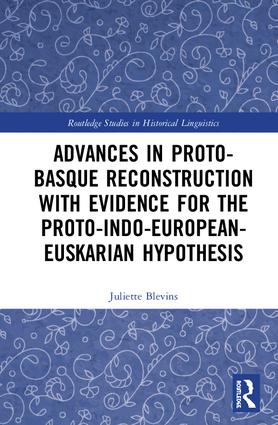Another short communication by Juliette Blevins has just been posted, A single sibilant in Proto-Basque: *s, *Rs, *sT and the phonetic basis of the sibilant split:
Blevins (to appear) presents a new reconstruction of Proto-Basque, the mother of Basque and Aquitanian, based on standard methods in historical linguistics: the comparative method and the method of internal reconstruction. Where all previous reconstructions of Proto-Basque assume a contrast between two sibilants, *s, a voiceless apical sibilant, and *z a voiceless laminal sibilant (Martinet 1955; Michelena 1977; Lakarra 1995; Trask 1997), this proposal is unique in positing only a single sibilant *s. Under this account, all instances of Common Basque /z/ are derived from *s. More specifically, in syllable coda, *Rs > *Rz (R a sonorant) while in the syllable onset, *sT > *zT (T an oral stop). The true split of *s into /s/ vs. /z/ occurs when clusters like *Rz or *zT are further simplified to /z/.
In this talk, internal evidence for a single sibilant, *s, in Proto-Basque is presented, and sound changes underlying the sibilant split are examined within the context of Evolutionary Phonology (Blevins 2004, 2006, 2015, 2017). Similar sound changes are identified in other languages with similar cluster types (e.g. Kümmel 2007:232), and the phonetic basis of the sibilant split is informed by recent studies of sibilant retraction (e.g. Stevens and Harrington 2016; Stuart-Smith et al. 2018).
 Blevins, already known for her previous work on the Basque language, was known internationally for her recent controversial proposal of a genetic relationship between Proto-Indo-European and Basque. Apparently, a book with her full model, Advances in Proto-Basque Reconstruction with evidence for the Proto-Indo-European-Euskarian Hypothesis, will be published by Routledge soon.
Blevins, already known for her previous work on the Basque language, was known internationally for her recent controversial proposal of a genetic relationship between Proto-Indo-European and Basque. Apparently, a book with her full model, Advances in Proto-Basque Reconstruction with evidence for the Proto-Indo-European-Euskarian Hypothesis, will be published by Routledge soon.
I was never convinced, not just about a genetic connection, but about the very possibility of discovering it if there was any, mainly because such a link would be quite old, and Basque is known to have been greatly influenced by surrounding IE prestige languages for millennia until it was first attested in the 16th century. Internal reconstruction can only avail a gross reconstruction of few aspects up to a certain point in time, probably not very far beyond the Pre-Roman period, and that only thanks to the available Aquitanian inscriptions.
There are indeed certain known migrations that could be linked with a pan-European population movement, the most likely one for this hypothesis being the Villabruna cluster (the Villabruna sample itself being of haplogroup R1b pre-P297), and especially the expansion of R1b-V88 lineages, found widespread in Europe from west to east, from Mesolithic Iberia to Khvalynsk.
This haplogroup is also found in Sardinia, which may be connected to the expansion of V88 subclades (which I have speculatively proposed could be linked to Afro-Asiatic) into Africa through Italy and the Green Sahara; although it could also be linked to a speculative Vasconic-Iberian – Palaeo-Sardo group.
Without knowing the exact Pre-Proto-Indo-European stage at which Blevins would place the Basque separation, it is difficult to know how it could fit within any macro-language proposal – and thus potential ancestral population expansion.
If you are interested in this hypothesis, I suggest Koch’s controversial paper of 2013 Is Basque an Indo-European Language? (PDF), appeared in JIES 41 (1 & 2)….And of course the many papers rejecting it in the same volume. You also have Forni’s writings supporting this association.
Seeing how many Basque nationalists (obviously obsessed with racial purity) are still rooting for an autochthonous Palaeolithic origin of R1b lineages (especially P312) linked with the Basque language and dat huge Vasconic Western Europe; and now, after Olalde & Mathieson 2018, how some are also suggesting a Neolithic link of R1b with the Neolithic expansion and Sardinians, for lack of further modern genetic differences with other Western Europeans… I wonder how a lot of people inclined to believe this nonsense today, and mentally linking Vasconic with haplogroup R1b, will be paradoxically necessarily tied precisely to this kind of macro-family proposals in the future.
Related:
- Haplogroup R1b-L51 in Khvalynsk samples from the Samara region dated ca. 4250-4000 BC
- First Iberian R1b-DF27 sample, probably from incoming East Bell Beakers
- Analysis of R1b-DF27 haplogroups in modern populations adds new information that contrasts with ‘steppe admixture’ results
- David Reich on social inequality and Yamna expansion with few Y-DNA subclades
- Olalde et al. and Mathieson et al. (Nature 2018): R1b-L23 dominates Bell Beaker and Yamna, R1a-M417 resurges in East-Central Europe during the Bronze Age
- Neolithic and Bronze Age Basque-speaking Iberians resisted invaders from the steppe
- Patterns of genetic differentiation and the footprints of historical migrations in the Iberian Peninsula
- Palaeolithic and Mesolithic connections between Italy and the Balkans, and the potential expansion of the Villabruna cluster and haplogroup R1b in Europe
- The myth of mixed language, the concepts of culture core and package, and the invention of ‘Steppe folk’
- The Indo-European demic diffusion model, and the “R1b – Indo-European” association